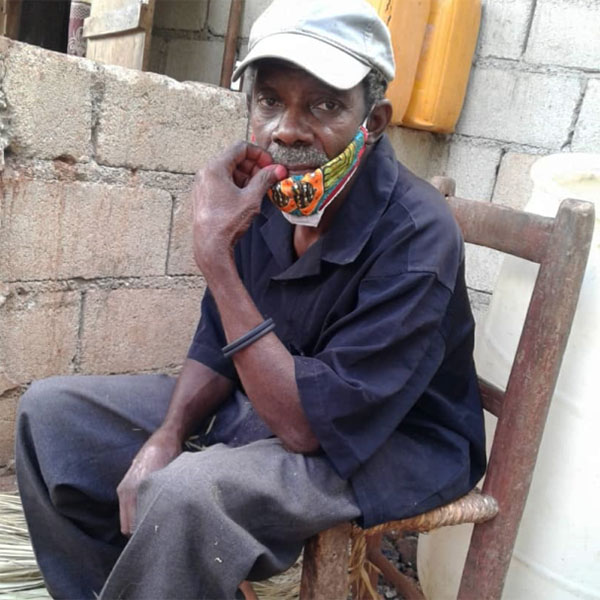Stories of Change

Irancier. Photo courtesy GRADAID.
Food Shortages and Growing Worries among Haiti’s Older Adults
“When I heard about the coronavirus, I felt extremely worried,” Irancier Morancy says. “I am already not in good health. If this disease gets to me, it will kill me quickly. On top of that, there are no good hospitals in the area to care for us.”
Irancier’s situation is heartbreakingly common for older adults in Haiti. CWS and our partners* recently conducted hundreds of interviews with older adults in several parts of the country to determine what impact the pandemic is having on this population and what their highest priority needs are.
We found that while nearly everyone knows about the pandemic, many cannot afford to protect themselves. Hunger is on the rise; 92% of people reported having to cut back on the quality or amount of food they were eating. As Irancier pointed out, access to healthcare is a significant challenge. And all of this is taking a heavy toll on mental wellness, with 49% of people reportedly feeling worried most or all of the time.
“The report’s alarming findings highlight the fragility of many systems and institutions in Haiti. Weak public institutions and political instability have challenged Haitians for generations, and the pandemic has exacerbated a situation that was already dire,” said Martin Coria, CWS’s Regional Director for Latin America and the Caribbean.
Irancier is one of the people who took the time to be surveyed. He’s a 67-year-old father of five who lives with his married daughter. “When I was healthy, I worked the land,” he says. “I was a farmer. But for the past nine years, I have been unable to work the land. Now I weave baskets for a living.”
The economic impacts of the pandemic have been swift and devastating. Border closures and restrictions on movement meant that supplies and products became scarcer. Families fell deeper into poverty.
“Honestly, this disease has affected me in every sense, because the baskets I make no longer sell,” Irancier shares. “Clients have no money. The country was blocked, and we couldn’t buy anything.”
Years of frustration and pain have left Irancier without faith or comfort in his healthcare options, either. “I suffer from prostate cancer and have used a catheter for seven years now,” he explains. “But I don’t have the money to change it often. I need medicines and when I don’t have them, I am in more pain. It makes me sad to see that I cannot get healthy. I am supposed to go to see a doctor every two weeks, but I cannot afford that, so I go every 4 or 5 months.”
The government has also not offered to support to struggling families like Irancier’s. “I have heard neither the government nor media speak about the lives of older people during COVID-19. Sometimes, I hear them talk about the disease on the radio, but I have not received any help or assistance from anyone. Even if there is food in the market, we don’t have money to buy it. It would be nice if they could help us so that we can buy food. If you don’t show charity, you are not a true leader,” he says.
Irancier’s message is a plea for empathy: “In Haiti the lives of older people are not easy at all. Since there are no government or local authorities in the country who think of older people, I would hope they know that those who are older people now used to be young. Even though they neglect the lives of older people in their programs, there will be a time that they will be older people as well, just like me.”
*This survey was conducted in partnership with GRADAID, TCPPAH, SCH and AGEHPMDNG with support from HelpAge International and Age International. Read our press release about the report for more information.
